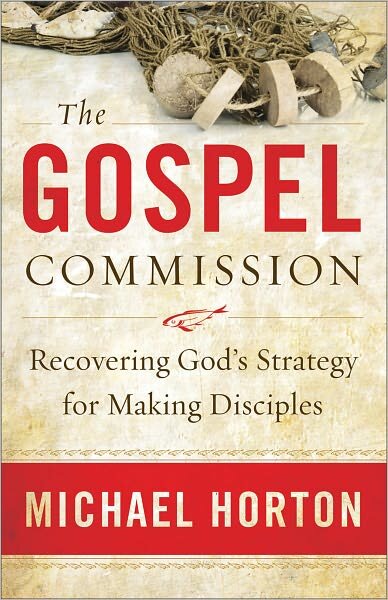Michael Horton, The Gospel Commission: Recovering God’s Strategy for Making Disciples. Baker Books, 2011.
LifeandLeadership.com Summary
Michael Horton is a popular author who conveys a conservative Reformed perspective on current issues (see bio below). Usually Horton offers a reasonable critique of the more popular level approaches to ministry. This is true of two of his more popular prequels, Christless Christianity and The Gospel Driven Life, and is no less the case with The Gospel Commission. The purpose of The Gospel Commission is “to call us away from ‘mission creep, centering our discipleship and our churches on the very specific sources, goals, strategies, and methods that Christ mandated for this time between his two comings.” By “mission creep,” he means “the expansion of a project or mission beyond its original goals, often after initial success.” (8)
Horton looks at all areas typically placed under the banner of “mission” through two select lens. One is the Great Commission from Matthew 28:18-20. The other is the role of “ambassador,” which he says “is the analogy that the New Testament employs for the work of fulfilling the Great Commission.” (12) These form the conceptual framework of the three parts of the book. Part One, The Great Announcement considers the true meaning of the gospel as “the triumphant announcement that all authority in heaven and on earth belongs to Jesus Christ.” (19) Part Two, The Mission Statement, presents an in-depth interpretation of the Great Commission, focusing on the issues of contextualization, or the challenge of making disciples in the context of relativism and religious pluralism. This includes a careful critique of incarnational models of ministry. Central to this section is Horton’s call to preserve the balance of all four components in the biblical order mission: God acts in history (drama), explains it in his word (doctrine), which leads redeemed sinners to a song life of praise (doxology), and forward in his new life (discipleship). Part Three, The Strategic Plan, looks at the “how” of making disciples, emphasizing the phrase, “teaching them to observe all that I have commanded.” This also looks closely at issues such as church leadership (elders, deacons, ministers), strategic planning, evangelism, discipleship, spirituality (e.g. critique of Richard Foster and Dallas Willard), and social justice, insofar as these factor into the way contemporary churches fall into or stay clear of mission creep.
I always benefit from reading Michael Horton, mainly because he simply is NOT trendy. He always offers a very irenic but probing analysis of the authors and approaches most others are raving about. Although he does so without conveying a contrarian spirit. His voice deserves a serious hearing from all who wish to approach issues of missional faithfulness and effectiveness in our era.
From the Publisher
Many churches in America today want to be powerful, relevant, and influential in personal and social transformation. But whose kingdom are we building? God’s? Or our own? A plethora of programs for outreach, discipleship, and spiritual disciplines are available at any bookstore and on countless websites. Yet what we need most is a renewed understanding of and commitment to the Great Commission. We assume that we already know the nature of this commission and the appropriate methods of carrying it out.
But Michael Horton contends that it too often becomes our mission instead of God’s. At a time when churches are zealously engaged in writing up mission statements and strategic plans, he argues that we must ask ourselves anew whether we are ambassadors, following the script we’ve been given, or building our own kingdoms with our own blueprint.
Pastors, church leaders, and readers of Horton’s Christless Christianity and The Gospel-Driven Life will value this frank and hopeful exploration of the Great Commission as a call to understanding and good practice.
“A rigorous yet accessible exegesis of both the Great Commission and contemporary Western culture. Today’s evangelicals all too often retreat from mission in light of social pressures or rush forward with a faulty missionary enterprise that is untethered from theology, unconcerned with discipleship, and obsessed with quantifiable results. Against this backdrop, Horton calls us to recover a biblical understanding of mission and restore its centrality in the life of the church. The Gospel Commission is filled with both penetrating analysis and pastoral guidance, and I recommend it enthusiastically.”—Doug Birdsall, chair, Lausanne Committee for World Evangelization
“Writing from the perspective of one who for more than fifty years has been involved in helping people in Africa know God through Bible study and acts of mercy, this book on missions by Michael Horton is the most comprehensive, helpful, and encouraging I have ever read. All mission sending agencies and their long and short-term missionaries should read it. It will be required reading for Rafiki’s missionaries and should be read by anyone who wants to participate in Christ’s great commission.”—Rosemary Jensen, founder and president, Rafiki Foundation, Inc.
About the Author
Michael Horton is J. Gresham Machen Professor of Systematic Theology and Apologetics at Westminster Seminary California. He is also the president of White Horse Media, for which he co-hosts the White Horse Inn, (http://www.whitehorseinn.org) a nationally syndicated, weekly radio talk-show exploring issues of Reformation theology in American Christianity. He is also the editor-in-chief of Modern Reformation magazine (http://www.modernreformation.org).
***For additional information on this resource, including reviews, click the bookstore links. Check the reference at page top or the links below for resource guides on related topics.***
Related Areas
See Other Resources on Evangelism:
See Resources on Over 100 Areas of Ministry Leadership:


